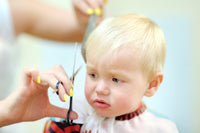By Kara Pleasants
None of us like to imagine that we will ever spend a night (or more) in the hospital. We struggle to organize our thinking around the possibility that we will deal with a crisis or two or three in our lifetime. Whether you don’t anticipate a hospital stay in your future, or if you’re coming to grips with a diagnosis that moved your family into a new category with medical complexity, it’s good to be prepared.
Having a solid emergency plan does not invite catastrophe: in fact, it keeps you grounded at a time when your world might be shaking. I am the mom of two daughters, and both have had hospital stays for different reasons. My oldest (now seven) had a cleft palate repair at 11 months and spend two nights in the hospital. My youngest (now three) was a micro preemie born at 27 weeks and has spent over 130 days in the hospital, 95 in the NICU.
Having a solid emergency plan does not invite catastrophe: in fact, it keeps you grounded at a time when your world might be shaking.
Although I am experienced, it took me time to adjust and figure out simple things that made life easier during a hospital stay. Aside from the essentials (wallet, ID, insurance cards, and medications), here are some tips about what to pack in a hospital bag for your family emergency kit!
-
A blanket. Hospitals are well-ventilated and temperature controlled. Sometimes, you might find yourself (or your child) being shuffled about in various states of undress. There’s nothing more comforting than a cozy blanket to wrap up in to snuggle and to cover up with during transitions.
Find a blanket that is soft to the touch, warm, but easy to fold and stuff in a small backpack. My favorite has been a blanket shawl I found at Target years ago for $7. It’s big enough to cover my lap plus a small child, and perfect for wrapping around your shoulders.
-
A favorite snack. Hospital food is horrible. Restaurant vendors are expensive. Even with kind intentions, hospitals usually don’t have something free for a parent if a child is the one being admitted other than water. If you have a picky eater (i.e. any toddler), you might be out of luck. If you have a child on a special diet, you might not have the right food available period.
Hunger and exhaustion combined make it more difficult to think straight when you need a clear head during a crisis. Once my daughter was unexpectedly admitted to the hospital because she struggled to get enough oxygen because of a nasty virus—I was travelling without my husband in a different state for a family wedding and wound up in the ER alone with a one-year-old for seven hours before finally being admitted (during which I couldn’t leave the room to go to the bathroom or find food). Give yourself the gift of energy and sanity by tucking a few favorite non-perishable foods into your hospital bag.
-
Books (for you and your child). During a hospital stay, there might come a time when nothing is happening and every show is awful and every electronic device you own is dead or charging. Wait times can be long—particularly if you’re in the category of needing help, but not in an active emergency (when things can move at warp speed).
Having something tactile like a book or magazine is another way to stay grounded during a stressful time and recharge. I’m still getting used to taking care of myself in addition to my children—I usually remember the kid’s book, but not one for me, even though reading for just six minutes reduces stress levels by 68%-- that’s faster and more effective than listening to music, meditation, walking, or having a cup of tea. Take care of yourself and have a stress-busting read at hand.
-
Paper and Pencil. One of the most important tools my husband and I used during our daughter’s 95-day NICU stay was a shared journal where we took medical notes. The longer we stayed, the more important we realized these notes were to keep a firm grasp on her continuity of care. Hospitals have rotations: nurses change every twelve hours; attending doctors change every two weeks; resident doctors change every month. You will notice staff putting in a vast amount of data into the electronic system, but none of it is accessible to you or comprehensive in the way that a journal record can be.
Your handwritten notes can be taken with you—to follow up visits, to a different hospital, or (hopefully) just home to reflect on and remember that time when you were at the hospital overnight. A journal is be a space for you to record your thoughts and feelings. To draw or to play tic tack toe. You can even use to write out a hasty (but thoughtful) thank you note to that nurse who charged your iPhone for you at the nurses station.
-
Toiletries. It’s silly how comforting it is for me to know that I have a tiny travel-size contact solution bottle and case, and my favorite travel shampoo, and my very own itty-bitty deodorant. I’ve been caught by surprise more times than I want to admit by an overnight hospital visit and had to literally use medicine cups and saline to preserve my contacts. Don’t be like me of the past. Get a small size 3-in-1 shampoo/conditioner/body wash and have a moment where you feel like a person in the shower at the hospital.
-
Charger and charge pack. Hospitals are no longer well equipped with phones to call relatives because cell phone are so ubiquitous. How do I know? Because when my phone died I tried to call my husband from the hospital room and it gave me an error message because it would only dial out for “local” calls (i.e. the city only). Some hospitals might have charge stations (in the hallway!), but even if you’re brave enough to leave your electronics out there, you’ll have to vie for space with other parents who also didn’t bring chargers. Instead, pack your charger and a charge pack for next-level preparedness in your emergency kit and play cartoons for your child all day long.
-
A lovey. Bring a stuffed animal or other washable toy with you for your young child to the hospital. This toy is invaluable not just as a way to offer comfort, but as a tool to help your child through procedures (especially if you have a toddler or preschooler). After her most recent overnight stay, my daughter came home with her baby doll covered in bandages—all identical to the ones she was sporting (and a few extra). Baby Blue got her through the tough stuff (even an IV is pretty tough for a kid). If it’s not an emergency situation, don’t be afraid to encourage nurses or doctors who haven’t learned this trick with kids to start with the lovey first—it really helps!
- Underwear. It’s super nice to be able to change your underwear in the morning after a hospital stay. If you have space in your bag and want to really go next level, you might even pack a whole change of clothes (stretchy and easy to sleep in are best so that you don’t need to change at night). But since you don’t know ahead of a crisis who is going to be in the hospital, it’s a little trickier to get into packing whole outfits ahead of time. If you have a small child, you might manage a change of outfit for them and some underwear for you. It’s ok if that’s all that will fit.
There you have it: eight things that you can fit in a backpack to take to the hospital in a crisis. I hope that for you, an unexpected hospital stay is a once-in-a-while event. But know that if it’s only once, or happens a lot, you’re not alone. You’ve got this.
-




